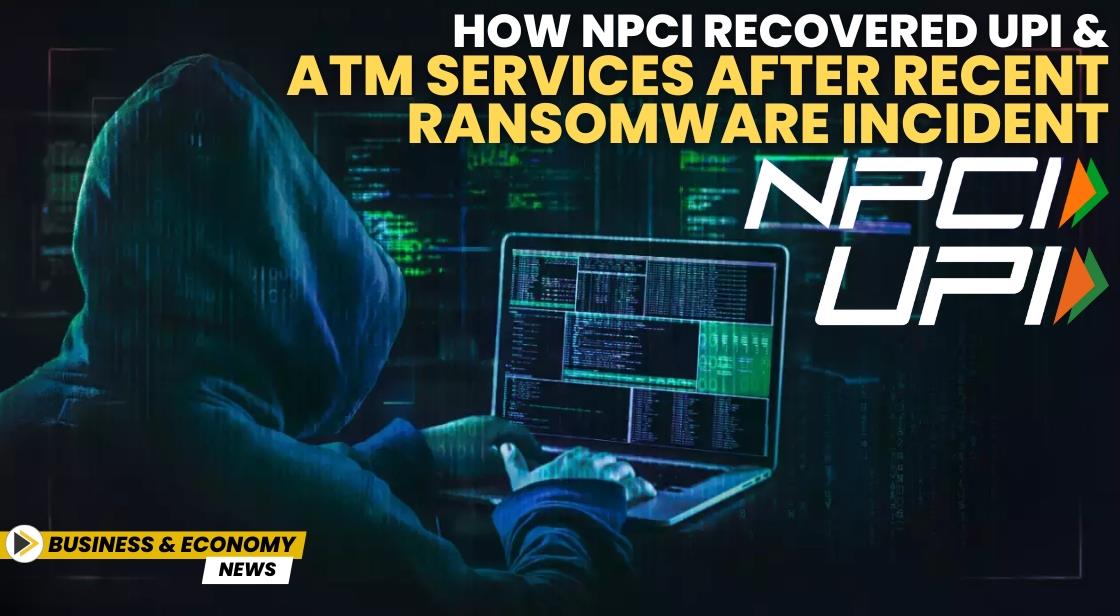How NPCI Recovered UPI and ATM Services After Recent Ransomware Incident

News Synopsis
The National Payments Corporation of India (NPCI) has successfully restored connectivity with C-Edge Technologies following a disruptive ransomware attack that occurred earlier this week. This significant recovery effort is vital for reinstating normal operations for numerous banking services that were impacted by the cyber incident.
The attack had led to substantial disruptions in payment services, affecting transactions and access for a broad range of banks and their customers. NPCI’s prompt action to restore connectivity and address the breach marks a crucial step in returning to normalcy and ensuring the stability and reliability of financial services across the affected institutions.
Details of the Ransomware Attack
The ransomware attack, attributed to the RansomEXX group, targeted Brontoo Technology Solutions, a significant partner of C-Edge Technologies. C-Edge Technologies, a joint venture between Tata Consultancy Services (TCS) and State Bank of India (SBI), plays a critical role in the Indian banking ecosystem. The breach led to a temporary shutdown of payment systems impacting numerous small banks across the country.
Impact on Regional Rural and Cooperative Banks
The security breach resulted in substantial disruptions for customers of nearly 300 Regional Rural Banks (RRBs) and cooperative banks. Users experienced difficulties with essential banking services, including fund transfers via NEFT (National Electronic Funds Transfer), UPI (Unified Payments Interface), and ATM withdrawals. The attack's immediate effect was a halt in these crucial financial transactions, impacting daily banking operations for a large number of users.
NPCI’s Response and Restoration Efforts
In response to the attack, NPCI swiftly acted to re-establish connectivity with C-Edge Technologies. The update, shared via X (formerly Twitter), confirmed that connectivity issues had been resolved. The NPCI’s immediate actions involved coordinating with C-Edge to address the breach and restore services.
Forensic Investigation and Security Measures
An independent forensic auditing firm was engaged to evaluate the security breach thoroughly. The investigation revealed that C-Edge Technologies had successfully contained the affected systems to prevent further spread of the ransomware.
The audit found that the ransomware’s impact was limited to C-Edge’s own systems, with no reported extension to the infrastructure of the cooperative and regional rural banks themselves.
Comprehensive Review and Future Precautions
Following the incident, NPCI has instructed C-Edge Technologies to undertake a comprehensive review of their systems and the breach incident. The audit, expected to be completed and submitted within two months, will provide detailed insights into the attack and assess the overall security posture of C-Edge. Preliminary findings of the audit have been shared with NPCI, which is actively monitoring the situation to prevent future disruptions.
Resumption of Banking Services
With the restoration of connectivity, affected banks have resumed providing their full range of services to customers. This includes the resumption of NEFT and UPI transactions and ATM withdrawals, which are critical for everyday banking operations. The swift restoration of services highlights NPCI’s commitment to maintaining the security and reliability of India’s payment systems.
Conclusion
The successful restoration of UPI and ATM services by NPCI following the recent ransomware attack marks a critical milestone in managing the disruption caused to India’s banking sector. NPCI's swift action to re-establish connectivity and initiate a comprehensive forensic investigation highlights its proactive approach to securing the country’s financial infrastructure. This response not only addresses the immediate impact of the breach but also underscores NPCI's commitment to preventing future security incidents. Continuous monitoring, coupled with thorough reviews of security protocols, will be essential in maintaining the integrity of payment systems and reinforcing public trust in India's financial operations.
What is NPCI and its work?
The National Payments Corporation of India (NPCI) is an umbrella organization for operating retail payment and settlement systems in India. Established in 2008 under the guidance of the Reserve Bank of India (RBI) and the Indian Banks' Association (IBA), NPCI is a non-profit organization designed to facilitate the development and implementation of innovative payment solutions across the country.
Key Functions and Responsibilities:
-
Payment System Innovation: NPCI spearheads the development of various payment systems and technologies, such as the Unified Payments Interface (UPI), National Electronic Funds Transfer (NEFT), and Real Time Gross Settlement (RTGS). These systems enhance the convenience and efficiency of financial transactions.
-
Retail Payment Solutions: NPCI operates several key payment platforms, including:
-
Unified Payments Interface (UPI): A real-time payment system allowing users to link multiple bank accounts to a single mobile application, facilitating instant money transfers.
-
National Electronic Funds Transfer (NEFT): A system enabling secure and easy electronic transfer of funds between banks.
-
Real Time Gross Settlement (RTGS): A system for high-value, real-time money transfers.
-
Bharat Interface for Money (BHIM): An app that promotes digital payments and provides users with a simple and secure way to make transactions.
-
RuPay: An Indian payment card network similar to Visa and Mastercard, offering debit and credit card services.
-
-
Financial Inclusion: NPCI works towards promoting financial inclusion by developing accessible payment solutions for underserved and remote regions. Initiatives like Aadhaar Enabled Payment Systems (AEPS) aim to provide banking services to the unbanked population.
-
Security and Compliance: NPCI ensures the security and reliability of payment systems by establishing robust security measures and compliance protocols. It collaborates with regulatory authorities to adhere to national and international standards.
-
Infrastructure Support: NPCI provides the necessary infrastructure and support to banks and financial institutions for implementing and operating various payment systems, thereby ensuring a seamless and efficient payment ecosystem.
Through its comprehensive suite of services and solutions, NPCI plays a crucial role in modernizing India’s payment systems, enhancing financial accessibility, and promoting the digital economy.
You May Like









